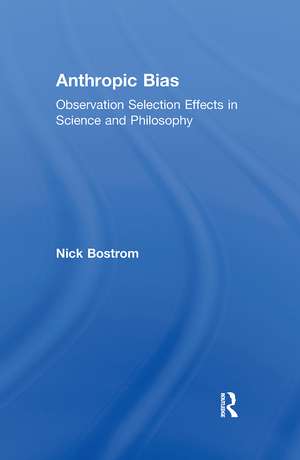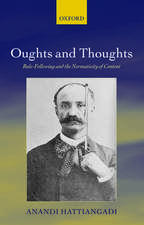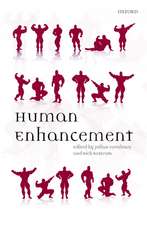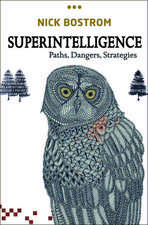Anthropic Bias: Observation Selection Effects in Science and Philosophy: Studies in Philosophy
Autor Nick Bostromen Limba Engleză Paperback – 18 iun 2010
There are the philosophical thought experiments and paradoxes: the Doomsday Argument; Sleeping Beauty; the Presumptuous Philosopher; Adam & Eve; the Absent-Minded Driver; the Shooting Room.
And there are the applications in contemporary science: cosmology ("How many universes are there?", "Why does the universe appear fine-tuned for life?"); evolutionary theory ("How improbable was the evolution of intelligent life on our planet?"); the problem of time's arrow ("Can it be given a thermodynamic explanation?"); quantum physics ("How can the many-worlds theory be tested?"); game-theory problems with imperfect recall ("How to model them?"); even traffic analysis ("Why is the 'next lane' faster?").
Anthropic Bias argues that the same principles are at work across all these domains. And it offers a synthesis: a mathematically explicit theory of observation selection effects that attempts to meet scientific needs while steering clear of philosophical paradox.
| Toate formatele și edițiile | Preț | Express |
|---|---|---|
| Paperback (1) | 362.89 lei 43-57 zile | |
| Taylor & Francis – 18 iun 2010 | 362.89 lei 43-57 zile | |
| Hardback (1) | 1037.84 lei 22-36 zile | +20.65 lei 6-12 zile |
| Taylor & Francis – 12 iul 2002 | 1037.84 lei 22-36 zile | +20.65 lei 6-12 zile |
Din seria Studies in Philosophy
- 9%
 Preț: 1004.96 lei
Preț: 1004.96 lei - 9%
 Preț: 1037.84 lei
Preț: 1037.84 lei - 19%
 Preț: 478.18 lei
Preț: 478.18 lei -
 Preț: 487.86 lei
Preț: 487.86 lei -
 Preț: 482.74 lei
Preț: 482.74 lei - 18%
 Preț: 1056.28 lei
Preț: 1056.28 lei - 18%
 Preț: 949.78 lei
Preț: 949.78 lei -
 Preț: 478.71 lei
Preț: 478.71 lei -
 Preț: 489.99 lei
Preț: 489.99 lei -
 Preț: 480.28 lei
Preț: 480.28 lei -
 Preț: 481.58 lei
Preț: 481.58 lei -
 Preț: 488.12 lei
Preț: 488.12 lei -
 Preț: 491.68 lei
Preț: 491.68 lei -
 Preț: 436.75 lei
Preț: 436.75 lei - 18%
 Preț: 1056.28 lei
Preț: 1056.28 lei - 18%
 Preț: 1056.63 lei
Preț: 1056.63 lei -
 Preț: 484.47 lei
Preț: 484.47 lei -
 Preț: 479.67 lei
Preț: 479.67 lei -
 Preț: 488.33 lei
Preț: 488.33 lei -
 Preț: 485.24 lei
Preț: 485.24 lei - 31%
 Preț: 763.39 lei
Preț: 763.39 lei -
 Preț: 482.35 lei
Preț: 482.35 lei -
 Preț: 434.84 lei
Preț: 434.84 lei -
 Preț: 482.35 lei
Preț: 482.35 lei -
 Preț: 480.07 lei
Preț: 480.07 lei -
 Preț: 444.23 lei
Preț: 444.23 lei - 18%
 Preț: 1106.81 lei
Preț: 1106.81 lei -
 Preț: 465.69 lei
Preț: 465.69 lei - 18%
 Preț: 1054.71 lei
Preț: 1054.71 lei - 18%
 Preț: 1056.71 lei
Preț: 1056.71 lei -
 Preț: 483.20 lei
Preț: 483.20 lei -
 Preț: 356.18 lei
Preț: 356.18 lei -
 Preț: 488.33 lei
Preț: 488.33 lei -
 Preț: 223.99 lei
Preț: 223.99 lei -
 Preț: 444.93 lei
Preț: 444.93 lei
Preț: 362.89 lei
Nou
Puncte Express: 544
Preț estimativ în valută:
69.45€ • 72.24$ • 57.33£
69.45€ • 72.24$ • 57.33£
Carte tipărită la comandă
Livrare economică 14-28 aprilie
Preluare comenzi: 021 569.72.76
Specificații
ISBN-13: 9780415883948
ISBN-10: 0415883946
Pagini: 244
Ilustrații: black & white illustrations
Dimensiuni: 152 x 229 x 13 mm
Greutate: 0.33 kg
Ediția:1
Editura: Taylor & Francis
Colecția Routledge
Seria Studies in Philosophy
Locul publicării:Oxford, United Kingdom
ISBN-10: 0415883946
Pagini: 244
Ilustrații: black & white illustrations
Dimensiuni: 152 x 229 x 13 mm
Greutate: 0.33 kg
Ediția:1
Editura: Taylor & Francis
Colecția Routledge
Seria Studies in Philosophy
Locul publicării:Oxford, United Kingdom
Cuprins
1. Introduction; 2. Fine-Tuning in Cosmology; 3. Anthropic Principles; 4. Thought Experiments Supporting the Self-Sampling Assumption; 5. The Self-Sampling Assumption in Science; 6. The Doomsday Argument; 7. ::; 8. ::; 9. ::; ch0010 Observation Selection Theory; 11. Observation Selection Theory Applied;
Recenzii
"From traffic analysis via a many-worlds interpretation of quantum mechanics and the problem of the fine-tuning of the universe to the purely philosophical problems of the Doomsday argument and the Sleeping Beauty problem, Bostrom succeeds in shining a new and interesting light on all of these issues." --Wouter Meijs
"Bostrom presents a highly readable and widely relevant work which can be warmly recommended to everyone in philosophy of science."--Christian Wuthrich, Philosophy of Science
"Probably the worst thing one can say about this book is that it is too short....Anthropic Bias is a wonderful achievement, which should find place on the shelf of every serious student of modern philosophy of science, epistemology, and cosmology." --Milan Cirkovic, Foundations of Science
"Anthropic Bias is a synthesis of some of the most interesting and important ideas to emerge from discussion of cosmic fine-tuning, the anthropic principle, and the Doomsday Argument. It deserves a place on the shelves of epistemologists and philosophers of science, as well as specialists interested in the topics just mentioned."--Neil Manson, Notre Dame Philosophical Reviews
"Bostrom presents a highly readable and widely relevant work which can be warmly recommended to everyone in philosophy of science."--Christian Wuthrich, Philosophy of Science
"Probably the worst thing one can say about this book is that it is too short....Anthropic Bias is a wonderful achievement, which should find place on the shelf of every serious student of modern philosophy of science, epistemology, and cosmology." --Milan Cirkovic, Foundations of Science
"Anthropic Bias is a synthesis of some of the most interesting and important ideas to emerge from discussion of cosmic fine-tuning, the anthropic principle, and the Doomsday Argument. It deserves a place on the shelves of epistemologists and philosophers of science, as well as specialists interested in the topics just mentioned."--Neil Manson, Notre Dame Philosophical Reviews
Descriere
Anthropic Bias explores how to reason when you suspect that your evidence is biased by "observation selection effects"--that is, evidence that has been filtered by the precondition that there be some suitably positioned observer to "have" the evidence. This conundrum--sometimes alluded to as "the anthropic principle," "self-locating belief," or "indexical information"--turns out to be a surprisingly perplexing and intellectually stimulating challenge, one abounding with important implications for many areas in science and philosophy.
There are the philosophical thought experiments and paradoxes: the Doomsday Argument; Sleeping Beauty; the Presumptuous Philosopher; Adam & Eve; the Absent-Minded Driver; the Shooting Room.
And there are the applications in contemporary science: cosmology ("How many universes are there?", "Why does the universe appear fine-tuned for life?"); evolutionary theory ("How improbable was the evolution of intelligent life on our planet?"); the problem of time's arrow ("Can it be given a thermodynamic explanation?"); quantum physics ("How can the many-worlds theory be tested?"); game-theory problems with imperfect recall ("How to model them?"); even traffic analysis ("Why is the 'next lane' faster?").
Anthropic Bias argues that the same principles are at work across all these domains. And it offers a synthesis: a mathematically explicit theory of observation selection effects that attempts to meet scientific needs while steering clear of philosophical paradox.
There are the philosophical thought experiments and paradoxes: the Doomsday Argument; Sleeping Beauty; the Presumptuous Philosopher; Adam & Eve; the Absent-Minded Driver; the Shooting Room.
And there are the applications in contemporary science: cosmology ("How many universes are there?", "Why does the universe appear fine-tuned for life?"); evolutionary theory ("How improbable was the evolution of intelligent life on our planet?"); the problem of time's arrow ("Can it be given a thermodynamic explanation?"); quantum physics ("How can the many-worlds theory be tested?"); game-theory problems with imperfect recall ("How to model them?"); even traffic analysis ("Why is the 'next lane' faster?").
Anthropic Bias argues that the same principles are at work across all these domains. And it offers a synthesis: a mathematically explicit theory of observation selection effects that attempts to meet scientific needs while steering clear of philosophical paradox.















